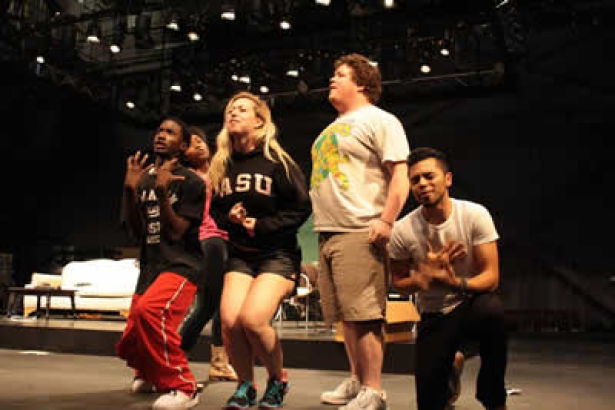Student production tackles race issues
UNCW’s Department of Theatre performs “We Are Proud to Present…,” a play that touches on race relations and cultural memory.
The lights fade, and the audience bursts into applause. The opening night for the student production of “We Are Proud to Present a Presentation,” held on Thursday, Feb. 13, was a success.
The play, written by Jackie Sibblies Drury, has been performed many times since 2012; however, UNC Wilmington is the first college in the nation to preform the work. Many themes, ranging from race to difficulties in cultural memory, are introduced over the course of the 90-minute production. The production is actually a play within a play; the audience watches as a fictional cast tries to recreate the events that led to Germany’s 19th century involvement in the genocide of the Herero, a group of South West African people.
Director Anne Berkeley chose this production because of the message it offers to a larger community. She also hoped the audience would be able to connect their personal experiences to the meaning of the production.
“The playwright makes connection[s] between colonialism and the mistreatment of blacks in his country, and I hope that students begin to think of these connections in a new way,” Berkeley said. “The events in history are related to our own history. I hope that students are able to make that connection.”
The cast is made up of six people: three African Americans and three Caucasians. The character Black Woman, played by Afreya Munroe, leads the group of actors on the journey to discovering the relationship between the Germans and the Herero.
As each person comes closer to discovering their characters, issues about race and gender are made present. The clear division of race plays an important part throughout the production. The audience is first introduced to the topic as the characters try to decipher written letters between a German husband and wife.
Several times, the characters Black Man and Another Black Man tell the other characters that they do not understand the weight of what they are doing because they will never be black. The play tries to teach the audience that race played a bigger part in the genocide, and that it is still an issue today.
Munroe was instantly drawn to the play when she read the script, soon realizing which character she wanted to play. Despite her interest in Black Woman, the overall message may be the most important reason she chose to participate in the play.
“When I read the script, I saw that the story was like a conversation within a conversation within a conversation,” Munroe said. “And it is a conversation that needed to be had in Wilmington and on this campus.”
The play is filled with intense moments that capture the audience’s attention. Dance and song help alleviate some of this tension in the production. Music and dance are often used to add meaning within performances, and this play was no different. The dances were the highlight of the play for Munroe and some members in the audience.
“I really like the dance that we do to the Ed Sheeran song because I feel like a lot of ways dance is more interpretative than just saying what you want to say,” Munroe said. “I love that dance because the words of the song are so powerful and the way that we dance is so powerful, and it brings across the message that the play is try[ing to] show.”
“It was really powerful. I’m kind of left without words this second. It was really moving. It seemed comical at first and then it takes a turn,” said Hannah Morton, a theater major, after seeing the play.
The UNCW production succeeds in getting its message across while entertaining the audience, and, according to Munroe, that’s the point of theater.
“You come there and enjoy yourself and have entertainment, but at the same time walk out with a different world view or learn something, gain a cultural understanding, and I feel like this play was really able to do that,” she said.








